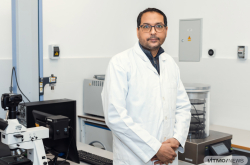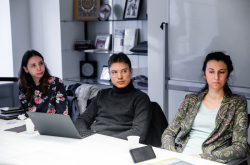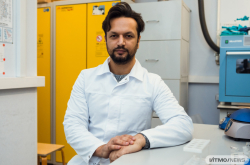ITMO Fellowship is a program that offers international researchers an opportunity to join the university for a period from two weeks to three years. In this time, they can teach a course, collaborate with ITMO researchers and publish articles, establish their laboratories, or even relocate their entire teams to ITMO.
In the past two years, 38 researchers from 10 countries have come to ITMO via the program; among them were the biotechnologists Amin Mousavi Khaneghah from Iran and Tamer El-Messery from Egypt, electrical engineer Jackson J. Justo from Tanzania, and physicist Muhammad Ali Abbasi from Pakistan. The program also attracts Russian researchers with international experience, for instance, Ksenia Chichay, who worked in Germany, Alisa Chaikovskaya, who completed her PhD in Spain, Iuliia Melchakova, who defended her PhD in South Korea, and Eugene Smirnov, who studied and worked in Switzerland.
“We launched ITMO Fellowship a decade ago to invite outstanding researchers to ITMO University. We believe that education and science bring the world together and help us grow as a society. That’s why we strive to attract as many strong researchers to ITMO as possible. At meetings like this one, all ITMO Fellows have the chance to get to know each other and establish grounds for future collaborations,” says Maria Didkovskaia, the head of ITMO Fellowship program and head of ITMO’s Internationalization Department.
At the meeting, participants of the program’s long-term tracks played games to learn more about each other. During a “speed-dating” session, each of them talked about their research, shared an interesting fact about themselves, and passed on the best advice they learned in life. And in a round of charades, the researchers guessed all kinds of scientific terms – including black holes, cell division, optical illusions, and quantum communications. The best players received gifts from the organizers.
Here’s what some of the ITMO Fellows had to share about the program:
Alyona Kulakova,
a researcher at ITMO’s School of Physics and Engineering

Alina Kulakova. Photo by Dmitry Grigoryev / ITMO.NEWS
I completed a joint PhD program by RUDN University in Russia and the University of Montpellier in France, while my research project was conducted at the Nesmeyanov Institute of Organoelement Compounds of the Russian Academy of Sciences. Thanks to my experience of working at three universities and my European education, I was able to secure my position as an ITMO Fellow last year – I am now a postdoc at the School of Physics and Engineering. ITMO Fellowship attracts world-renowned scientists, helping them build new collaborations and develop cutting-edge scientific fields. For me, it provided an opportunity to move from Moscow to St. Petersburg, learn new skills through ITMO's professional development courses, and begin my research into the design of metal-organic frameworks. These hybrid materials are like porous sponges that can adsorb and transport various substances. For instance, we are trying to use them to purify air from carbon dioxide and reduce the greenhouse effect. Through speed-dating sessions at the meet-up, I met all the new participants in the program, had a great time, and even reconnected with old acquaintances.
Thanh Son Cam,
a researcher at ITMO’s Center of Optical Information Technologies

Thanh Son Cam. Photo by Dmitry Grigoryev / ITMO.NEWS
I am originally from Vietnam, but I received all of my degrees – from Bachelor’s to PhD – in Russia. Therefore, when it came time to choose where and what I wanted to do after defending my thesis, I chose this country again. After ten years of living here, I have become accustomed to St. Petersburg, its culture, and its weather, and I have even mastered the Russian language. A month ago, I joined the ITMO team as a Fellow upon the recommendation of my supervisor, Sergey Shipilovskikh, a leading researcher at the Center of Optical Information Technologies. Together with him and his team, we synthesize derivatives of metal-organic frameworks that will help remove harmful compounds, such as carbon monoxide or hydrogen sulfide, from the atmosphere. I appreciate that at ITMO, researchers can work freely and have access to all the necessary equipment. For me as a newcomer, this meeting was an excellent opportunity to learn more about the program, meet other participants, and find collaborators for future articles.
Mikhail Sokolov,
a leading researcher at ITMO’s Institute of Laser Technologies

Mikhail Sokolov. Photo by Dmitry Grigoryev / ITMO.NEWS
Before joining ITMO, I worked for over twelve years in various countries, including the UK, Japan, Sweden, Germany, and Finland. I researched laser technologies, designed solar power plants, developed technology for extracting minerals from asteroids, taught physics, mathematics, and English to students, and eleven years ago, I even helped organize a fellowship program at Lappeenranta-Lahti University of Technology (Finland). In 2022, I returned to Russia, but I discovered that only a few universities in St. Petersburg are developing laser technologies, ITMO being one of them. Here, I am teaching a course on industrial laser technologies and developing an AI feedback system that could potentially replace human operators of laser units. At the meeting, I had the opportunity to connect with new people and discuss joint projects with my colleagues.












